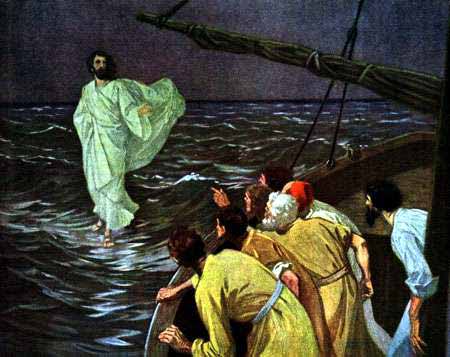Ghosts . . . In The Bible?
Ghosts are Biblical. Who knew? Who actually believes that? I’m aware of at least three references to ghosts in Scripture, one in the Old Testament and two in the New.
The first may be the most disquieting. King Saul, having disobeyed a command from God and having received the pronouncement from the prophet/judge Samuel that God would replace him with a man after His own heart, still clings to his throne. He says it’s for the sake of his descendants, but at one point he threatens to kill Jonathan, the son who should inherit the throne, for being friends with David. He was jealous, fearful, angry, and still expecting God to answer him, protect him, bless him, despite all the evidence to the contrary. In this respect he reminds me of Samson who was unaware that the Spirit of God had left him.
But back to Saul. He faced enemy encroachment of his kingdom pretty much from day one. For a time, God was with him and even fought for him, but toward the end of his reign, Samuel died and God went silent. No prayer or sacrifice Saul performed brought him any clarity concerning the present adversity he faced. He wasn’t used to going it alone when he was faced with an enemy army that far outnumbered his own.
Saul’s answer was to hold a seance.
Without too much trouble he found a medium who knew how to bring up the dead. Today most people go to seances to hear from a dead relative, but Saul wanted to know God’s mind. So he told the medium to bring back the prophet Samuel. And he showed up.
She did not bring him back to life, so how else are we to understand this appearance of Samuel after he died? I don’t think there’s really any doubt that if we were present, we’d have said we saw Samuel’s ghost. You can read the account in 1 Samuel 28:3-20.
The other instances are not actual appearances of a ghost but they are people thinking they saw a ghost. The people in question were the disciples, and the ghost they thought they saw was Jesus, once before he’d died and once after.
The first account was after Jesus had fed 5000 men and an uncounted number of women and children with a few loaves of bread and some fish. Jesus sent his disciples away and the people then left. It was late at night and the disciples were struggling against the wind as they tried to navigate their boat across the sea. Jesus came to them walking on water. As you can expect, since they’d never heard of or seen a man walk on water, they were afraid and came to the conclusion that they were seeing a ghost. Though Jesus had not yet died. He assured them that no, He wasn’t a ghost. You can read this account in several of the gospels: Matthew 14:22-33 and Mark 6:47-52.
The third account was similar in nature—the disciples saw Jesus and thought they were seeing a ghost, but this time He actually was dead. He was also raised from the dead and had His glorified body. So he said in no uncertain terms that he was not a ghost. Interestingly, he did not say, There are no such things as ghosts.
All this to point out that the portrayal of the supernatural at Halloween is not necessarily of creatures or beings that do not exist. Ghosts apparently do exist. The Bible also makes it clear we aren’t to solicit them for whatever purpose. Like Saul’s medium did.
These accounts bring up a lot of questions for me. For instance, what kind of power did that medium have that she could communicate with the dead and call them up so she could have a conversation with them?
These Biblical accounts make me realize that 99.9 percent of the depictions of ghosts in fiction are categorically wrong. Ghosts don’t apparently have a will to come back, to warn people, to scare people. They aren’t shapeless nothings floating through they air, and they don’t look like bed sheets with eye and mouth holes.
Of course fiction aims to be realistic, not real, so does it matter that authors have, for centuries, depicted ghosts in ways that don’t square with what the Bible says? Shakespeare did it, and just as famously, so did Charles Dickens (see “A Ghost Story Of Christmas“). Hundreds of other writers have done so in the years that followed, some with more success than others.
Ghost stories, to me, are much like demon and angel stories. Real angels and demons do exist, but few stories stick to the Biblical narrative that show us what those supernatural beings are like.
Does it matter?
I’m of the mind set that most readers can discern what’s pretend and what isn’t. But the water is a little muddy when angels or ghosts or demons can be real but also pretend.

Bowtruckles: small twig-like creatures that guard wand-wood trees
The question is, what does using the supernatural as pretend accomplish? Some authors undoubtedly do not believe in the reality of supernatural beings, so they consider them as fair game, in the same way as other mythical creatures. Others use supernatural creatures for the fright value or the comfort value they can add to a story. Still a few want to convey their reality.
Here’s the final question, should Christians take real supernatural beings, like ghosts, and write about them as if they are pretend? What are your thoughts?































I think it’s fine to write about them in certain contexts. One thing to consider is that they Bible doesn’t give us THAT much detail about how demons, angels, ghosts, etc are, so we actually have a lot of room to speculate with. Even some of the Bible’s depictions of supernatural beings could arguably be seen as representation rather than what these beings would actually look like. Revelations, for instance, uses tons of representation.
When I have supernatural beings in my Christian fiction stories, I try to have them make sense with what the Bible says, even if they don’t exactly follow every description in the Bible. And on the rare times when they don’t…I have a reason for it. Many of my demon and angel characters, for instance, have animal based physical forms, instead of humanoid ones. There are many reasons for this.
Part of it is because I think it’s cool and I have an easier time drawing animals. But in the Bible, angels and demons often seemed to be on the earth to fulfill God’s will or, in the case of demons, their own whims. Often enough, it is easier for angels and demons in my stories to fulfill those goals if they are in an animal form. This is partly because animals would have an easier time surviving the environments of some of my story worlds, and partly because some of my worlds are inhabited solely by animal characters, and an angelic being wouldn’t want to stand out by choosing a humanoid form.
I think we have to remember that things happened a certain way in the Bible because of the circumstances of our earth. Angels seemed to appear as humans because they came to talk to humans. In a world where there are few, if any, humans, who’s to say that angels wouldn’t look like animals or trees or rocks or something? If we want to write a fantasy story that makes sense with scripture, we have to consider such things.
You made a lot of good sense and actually reminded me of C. S. Lewis choosing a lion to represent Christ. He asked, essentially, how would God reveal Himself in a world that consists of talking animals? So I don’t see how you’re saying anything very different.
Becky
Very good discussion, and seasonal :). I like your approach to the witch of Endor. How Christians approach “ghosts” in their fiction can be problematic, I agree. My own ghost story Jezebelle has the devil’s hand interfere with her death and that’s how she “returns,” a spirit of complete evil, to haunt a small southern town and wreak no small havoc as the story progresses. That’s what a “ghost” would be, an evil spirit over which the Christian has authority, like the demons — IF such a thing could ever occur, which again is problematic, given that the Word doesn’t tell us we fight the spirits of the dead. (I do like a good ghost story however, as a story). That being said, I must respectfully disagree with the trendy interpretation of “A ghost does not have flesh and bone,” which Jesus said (Lk. 24:38-40) — as an endorsement of the reality of ghosts. The Greek is pneuma — spirit, not ghost. Jesus is not saying ghosts are real and abroad in the world, He’s saying He has a resurrection body that can be touched. The difference here is that between spirit and flesh, not dead and living. And no matter how you slice this pie, this verse is by no means an endorsement of popular culture’s ideas of ghosts like in Ghost Whisperer et al. God calls that toevah, abomination, and He means it. Ghosts may be an acceptable “critter” in a speculative story, but not in a way that is the opposite of what God says. We do not seek the dead. Nor should our “heroes” either. Thank you for reminding us there is more to the “real world” than our eyes behold.
I think you’re right, HG. I think what Jesus said is less an indication of the reality of ghosts than it was his acknowledgement that his audience believed ghosts to be real. I especially like this line: //Ghosts may be an acceptable “critter” in a speculative story, but not in a way that is the opposite of what God says.//
Becky